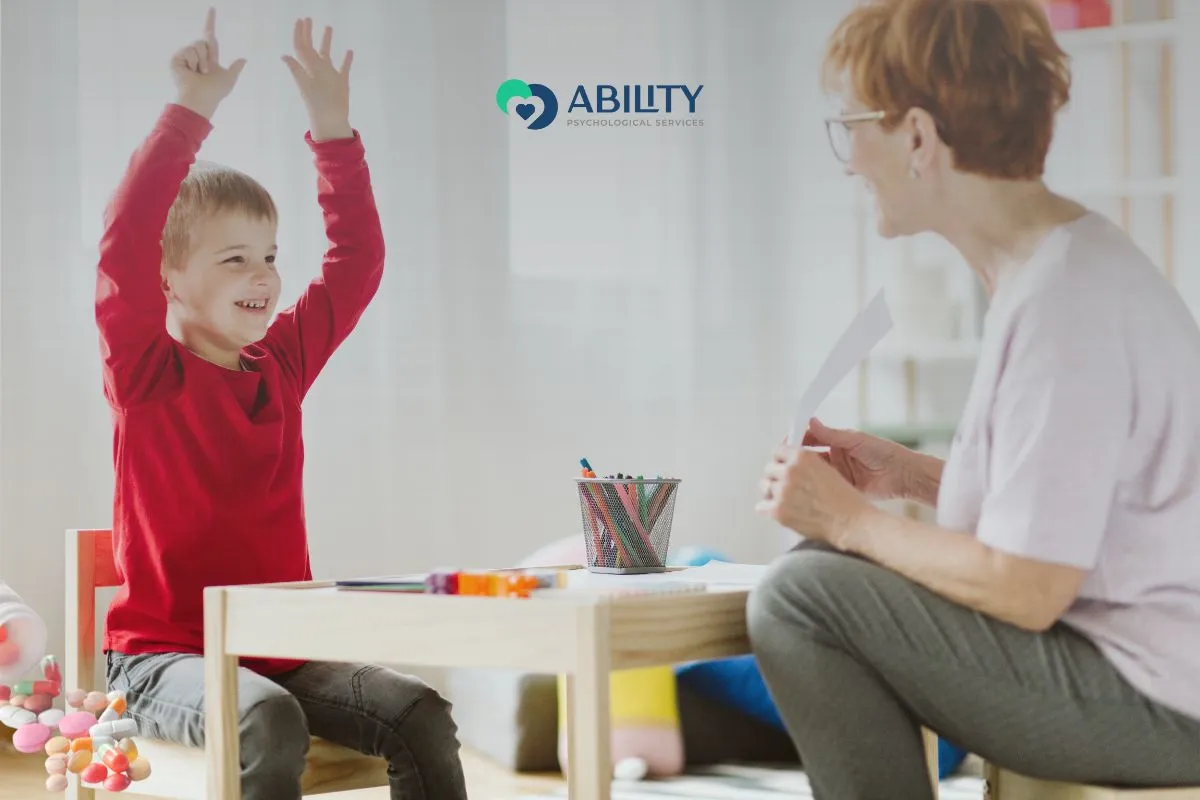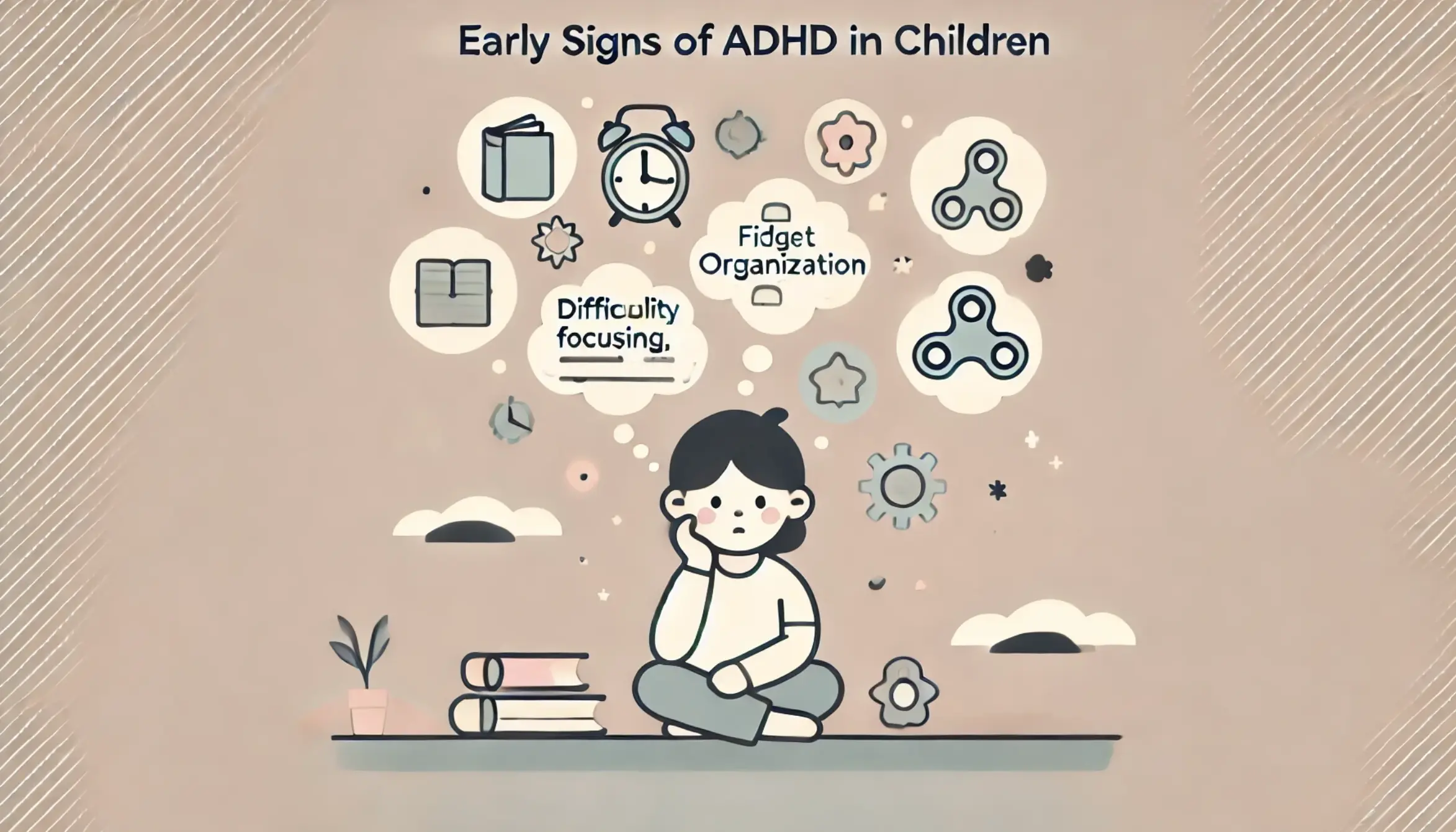Welcome to our comprehensive guide on “Understanding Neurodevelopmental Evaluations.” If you or someone you care about is facing learning, behavior, or development challenges, this blog is your roadmap to demystifying the evaluation process.
Neurodevelopmental evaluations are crucial in identifying and addressing cognitive, emotional, and social difficulties in children and adults. In this guide, we will unravel the complexities of these assessments, exploring their purpose, methodologies, and benefits.
Whether you’re a concerned parent, a teacher, or an individual seeking answers, our expert insights and practical tips will empower you to navigate the evaluation journey with confidence and clarity.
What are Neurodevelopmental Evaluations?
Neurodevelopmental evaluations are comprehensive assessments conducted by medical professionals to assess individuals’ cognitive, physical, communicative, and social development, particularly children.
These evaluations are essential for identifying and diagnosing neurodevelopmental disorders such as autism spectrum disorder, learning disorders, attention-deficit/hyperactivity disorder (ADHD), and various intellectual disabilities.
During the evaluation, a cross-functional team, including psychologists, pediatricians, speech therapists, and occupational therapists, observes the individual’s behavior, conducts standardized tests, and reviews medical history to understand their developmental progress better.
The results aid in creating tailored intervention plans, enabling early detection, and providing crucial support for individuals and their families.
The Importance of Neurodevelopmental Evaluations
Neurodevelopmental evaluations hold paramount importance in the field of healthcare. These assessments are crucial in identifying and diagnosing neurodevelopmental disorders, allowing for early intervention and tailored treatment plans.
By thoroughly evaluating an individual’s cognitive, motor, and social development, these assessments provide valuable insights for parents, caregivers, and healthcare professionals to better understand the individual’s strengths and challenges.
Early detection through these evaluations can lead to timely support and therapies, optimizing the individual’s potential for growth and progress.
Moreover, neurodevelopmental evaluations contribute to a deeper understanding of neurological conditions, furthering research and refining therapeutic approaches for individuals with diverse developmental needs.
Who Conducts Neurodevelopmental Evaluations?

A multidisciplinary team of qualified healthcare professionals with expertise in various fields typically conducts neurodevelopmental evaluations. This team may include child psychologists, pediatricians, neurologists, speech-language pathologists, occupational therapists, and developmental specialists who work together to evaluate, diagnose, and treat the individual accurately.
Each professional contributes a unique perspective and skill set to the evaluation process, enabling a comprehensive assessment of the individual’s cognitive, motor, communication, and social development.
The collaboration of these specialists ensures a holistic approach to understanding the individual’s strengths and challenges, leading to accurate diagnoses and personalized intervention plans for neurodevelopmental disorders. Their expertise and knowledge significantly support individuals and their families developmental journey.
The Process of Neurodevelopmental Evaluations
Neurodevelopmental evaluations involve a systematic and comprehensive approach to assessing an individual’s cognitive, motor, communication, and social development. It begins with gathering pertinent medical history and information from caregivers or parents.
A team of professionals, including psychologists, pediatricians, speech therapists, and occupational therapists, then conducts various behavioral observations, standardized tests, and interviews with the individual and their family.
These evaluations aim to identify neurodevelopmental disorders like autism spectrum disorder, ADHD, or intellectual disabilities. The results offer valuable insights into the individual’s strengths and challenges, guiding the formulation of personalized intervention plans and support strategies to enhance their overall development and quality of life.
Conditions Assessed Through Neurodevelopmental Evaluations
Neurodevelopmental evaluations are instrumental in assessing a range of conditions that impact an individual’s cognitive, motor, communication, and social development.
These assessments are crucial in diagnosing neurodevelopmental disorders such as autism spectrum disorder (ASD), specific learning disorders like dyslexia and dyscalculia, intellectual disabilities, and attention-deficit/hyperactivity disorder (ADHD).
Additionally, the evaluations can help identify conditions like developmental delay, speech, and language disorders, motor coordination difficulties (e.g., dyspraxia), and sensory processing disorders.
By pinpointing these conditions early on, the evaluations pave the way for targeted interventions and support to enhance the individual’s functioning and overall well-being.
Autism Spectrum Disorders (ASD)
Autism Spectrum Disorder (ASD) is a complex neurodevelopmental condition characterized by challenges in social interaction, communication, and repetitive behaviors. We refer to this disorder as a “spectrum” because individuals with ASD exhibit various symptoms and severity levels.
Some may have exceptional abilities in certain areas, such as mathematics or art, while facing significant social skills and sensory processing challenges.
Early signs often appear in early childhood, and a formal diagnosis typically occurs based on behavioral observations, developmental history, and standardized assessments. Early intervention and support can significantly improve the quality of life and outcomes for those with ASD.
Attention-Deficit/Hyperactivity Disorder (ADHD)
Attention-Deficit/Hyperactivity Disorder (ADHD) is a neurodevelopmental disorder most typically diagnosed in childhood but can persist into adolescence and adulthood. It is characterized by persistent inattention, impulsivity, and hyperactivity patterns that impact daily functioning and academic performance.
Individuals with ADHD may have difficulty retaining attention, organizing tasks, or following through on instructions.
They may be easily distracted and forgetful. Hyperactivity can manifest as excessive fidgeting, restlessness, or talking excessively. ADHD can lead to challenges in academic, social, and occupational settings. Early diagnosis and multimodal interventions, including behavioral therapy and medication when necessary, can effectively manage ADHD symptoms and improve overall functioning.
Intellectual Disabilities
Intellectual Disabilities (ID) are neurodevelopmental conditions characterized by limitations in intellectual functioning and adaptive behavior. Individuals with ID may experience difficulties in conceptual, social, and practical adaptive skills necessary for everyday life.
The onset of intellectual disabilities often occurs during the developmental period, and the severity can vary widely. Typically, the basis for diagnosis relies on standardized IQ tests and assessments of adaptive functioning.
Intellectual disabilities can impact learning, communication, and independent living skills, leading to challenges in academic and social contexts. However, with appropriate support, early intervention, and specialized education, individuals with ID can significantly improve their abilities and lead fulfilling lives.
The Benefits and Limitations of Neurodevelopmental Evaluations
Neurodevelopmental evaluations play a pivotal role in understanding cognitive and behavioral complexities, aiding individuals of all ages in their quest for optimal functioning and well-being.
This insightful section will delve into the myriad advantages these assessments offer, from early detection of developmental delays to personalized interventions. However, we won’t shy away from addressing their limitations, acknowledging the complexities and challenges that arise in the evaluation process.
Join us as we navigate the realm of neurodevelopmental evaluations, empowering you to make informed decisions and embrace a holistic approach to growth and progress.
Understanding Individual Strengths and Weaknesses
Understanding an individual’s strengths and weaknesses is essential for fostering personal growth and development. Each person possesses unique abilities, talents, and challenges. Recognizing strengths can boost confidence and motivation, encouraging individuals to excel in areas where they shine.
Acknowledging weaknesses allows for targeted efforts to improve and overcome limitations. This self-awareness helps set realistic goals and make informed decisions about education, career choices, and personal pursuits.
Furthermore, understanding the strengths and weaknesses of others promotes empathy and effective collaboration, as it enables people to complement each other’s skills and support one another in areas of difficulty. Embracing these differences fosters a harmonious and thriving society.
Informing Tailored Intervention Plans
Informing tailored intervention plans is critical to effectively addressing various developmental challenges and disorders. By conducting comprehensive assessments and understanding an individual’s unique strengths and weaknesses, healthcare professionals can design personalized intervention strategies.
These plans encompass a range of therapies, educational support, and behavioral interventions geared toward addressing specific needs. Whether it’s autism spectrum disorder, ADHD, intellectual disabilities, or learning disorders, tailored interventions consider the individual’s preferences, learning style, and goals.
The aim is to optimize outcomes, enhance developmental progress, and improve quality of life overall. Such personalized approaches foster greater engagement, motivation, and success in achieving positive developmental results.
Facilitating Early Intervention Services

Facilitating early intervention services is crucial in promoting the optimal development of children facing various challenges.
Early intervention targets developmental concerns as soon as detected, maximizing the benefits of brain plasticity and learning during the early years.
Children can make significant progress and bridge developmental gaps by promptly addressing speech delays, motor difficulties, or behavioral concerns.
Early intervention services are often provided through a multidisciplinary team of professionals, including occupational therapists, psychologists, speech therapists, and educators.
These family-centered programs empower parents to actively participate in their child’s growth while offering essential support and resources to enhance the child’s developmental journey.
Preparing for a Neurodevelopmental Evaluation
If you or a loved one is scheduled for a neurodevelopmental assessment, understanding how to prepare for this critical process can make a significant difference. A neurodevelopmental evaluation is a comprehensive and specialized assessment that aims to uncover strengths, challenges, and developmental concerns.
This section will equip you with essential insights and practical tips to help you or your child feel confident and at ease before, during, and after the evaluation. From gathering relevant information to fostering a supportive environment, join us on this journey of preparation, empowerment, and growth.
Gathering Relevant Information and Documentation
Gathering relevant information and documentation is crucial in various processes, including medical assessments, educational evaluations, and legal proceedings. It systematically collects pertinent data from reliable sources to make informed decisions or diagnoses.
For healthcare professionals, obtaining medical history, past diagnoses, and treatment records is essential for accurate assessments and treatment planning. In educational settings, gathering academic records, progress reports, and teacher observations provides valuable insights into a student’s learning journey.
Relevant documents help build solid cases or support legal claims in legal contexts. Properly collating and analyzing this information ensures a comprehensive understanding of the situation, enabling professionals to provide the best possible guidance and support.
Preparing the Child or Individual for the Evaluation Process
Preparing the child or individual for evaluation ensures a smooth and successful assessment. Clear communication and age-appropriate explanations about the purpose and procedures of the evaluation can alleviate anxiety and uncertainty.
Creating a comfortable and supportive environment fosters trust between the individual and the evaluating professionals.
Informing the individual about what to expect during the evaluation, such as the types of tests or possible questions they may need to answer, can help them feel more at ease. Encouraging them to express their feelings and ask questions further empowers their active participation, leading to more accurate and insightful evaluations.
Addressing Common Concerns and Anxieties
Addressing common concerns and anxieties is essential in various situations, including medical evaluations, educational assessments, and personal challenges.
Taking the time to listen attentively to individuals’ worries and fears demonstrates empathy and understanding. Providing clear and accurate information about the process, potential outcomes, and available support helps dispel uncertainties.
Offering reassurance and highlighting the individual’s strengths and resilience can boost confidence and reduce anxiety. Discussing potential treatments and interventions in healthcare settings can alleviate fears about the unknown.
In education, addressing academic challenges with tailored support strategies instills a sense of hope and motivation. Acknowledging and addressing concerns fosters a supportive and collaborative environment, facilitating positive outcomes.
What to Expect During a Neurodevelopmental Evaluation
A neurodevelopmental evaluation is crucial in understanding cognitive, emotional, and behavioral patterns, empowering individuals to thrive and reach their full potential. This guide demystifies the evaluation process, exploring its intricacies and purpose. From the role of different professionals to parental involvement, we’ll shed light on the comprehensive nature of these assessments. Join us as we unravel the mysteries, equipping you with valuable insights to navigate the evaluation confidently and clearly.
Length of the Evaluation Process
The length of the evaluation process can vary depending on the nature and complexity of the assessment. Some evaluations, like brief screenings, may be completed in a single session, lasting a few hours.
However, comprehensive neurodevelopmental evaluations or diagnostic assessments can take several sessions over weeks or months. Factors such as the individual’s age, the number of domains assessed, and the availability of professionals and resources can influence the duration.
While a more extended evaluation may be time-consuming, it ensures thorough and accurate results, guiding the development of effective intervention plans tailored to the individual’s unique needs.
The Role of Different Professionals in the Assessment
The assessment process involves the collaborative efforts of various professionals, each bringing their expertise to the table. Psychologists are vital in administering standardized tests and conducting behavioral observations, providing insights into cognitive and emotional functioning. Pediatricians contribute by gathering medical history and ruling out any underlying medical conditions.
Speech-language pathologists assess communication skills, while occupational therapists focus on motor skills and sensory processing. Developmental specialists help identify milestones and track developmental progress. Educators offer valuable input on academic performance and learning styles.
The collective expertise of these professionals ensures a comprehensive evaluation, leading to accurate diagnoses and the formulation of effective intervention plans tailored to the individual’s unique needs.
Parental Involvement and Participation
Parental involvement and participation are crucial to the evaluation process, particularly in assessing children and adolescents. Parents’ active engagement provides valuable insights into their child’s development, behavior, and challenges.
Their input helps professionals comprehensively understand the child’s strengths and weaknesses across various settings. Additionally, parents’ knowledge of the child’s medical history and family dynamics contributes significantly to the evaluation.
Moreover, involving parents fosters a collaborative approach, ensuring they are well-informed about the assessment process, its outcomes, and potential interventions. This partnership empowers parents to make informed decisions and play a central role in their child’s developmental journey.
Interpreting the Results of Neurodevelopmental Evaluations
Neurodevelopmental evaluations provide valuable insights into cognitive abilities, emotional functioning, and developmental challenges, offering a roadmap for personalized interventions and support.
In this comprehensive section, we’ll walk you through the process of understanding evaluation outcomes, decoding complex assessments, and translating them into actionable steps for growth and progress. Join us as we empower you to make educated decisions and pave the way for a brighter future.
Understanding Assessment Scores and Metrics
Understanding assessment scores and metrics is essential for interpreting evaluation results accurately. Various standardized tests and rating scales generate scores that can be complex to decipher. Professionals use these scores to compare an individual’s performance with established norms or benchmarks.
A higher score may indicate advanced abilities in certain areas, while a lower score might highlight potential challenges. However, it’s crucial to remember that scores are just one piece of the puzzle.
Interpreting them with qualitative observations and contextual factors provides a comprehensive understanding of the individual’s strengths and weaknesses. Properly comprehending assessment scores ensure informed decision-making and tailored intervention plans.
Identifying Areas of Strength and Concern
Identifying areas of strength and concern is a key objective of the assessment process. Professionals evaluate an individual’s cognitive, motor, communication, and social development to pinpoint specific areas where they excel and areas that may require additional support.
By recognizing strengths, such as exceptional abilities in academics or creative talents, professionals can build upon these assets to enhance overall development.
Simultaneously, identifying concerns, such as delays in speech or difficulties with social interactions, allows for early intervention and targeted strategies to address challenges effectively. This balanced approach empowers individuals to leverage their strengths while receiving the support needed to overcome developmental obstacles.
Formulating Individualized Recommendations
Formulating individualized recommendations is a crucial outcome of the assessment process. Based on the comprehensive evaluation results and a deep understanding of an individual’s strengths and concerns, professionals develop tailored guidance and support strategies.
These recommendations encompass a range of interventions, therapies, and accommodations designed to address specific needs. For neurodevelopmental disorders, such as ASD, ADHD, or SLD, individualized recommendations may include behavioral therapies, educational support, and assistive technologies.
The goal is to optimize the individual’s potential, foster skill development, and improve overall functioning. Individualized recommendations empower individuals and their families to make informed decisions and implement strategies that best suit their unique developmental journey.
Creating Intervention Plans Based on Evaluation Results

A neurodevelopmental evaluation lays the foundation for personalized and effective interventions, guiding individuals toward positive transformations. Armed with a comprehensive understanding of evaluation outcomes, we can now take the next critical step – crafting intervention plans that address specific strengths and challenges.
This section will explore evidence-based strategies, therapeutic approaches, and educational support systems that align with evaluation results.
Developing Individualized Education Plans (IEPs)
Developing Individualized Education Plans (IEPs) is critical for students with diverse learning needs. IEPs are comprehensive documents that outline personalized educational goals, accommodations, and services to support the student’s academic and developmental progress. Educators, parents, and relevant professionals collaborate to design the IEP, considering the student’s strengths, challenges, and specific learning objectives. These plans may include specialized instruction, speech therapy, occupational therapy, or behavioral support tailored to the student’s unique learning style and needs. Regular progress monitoring ensures the IEP remains effective and adaptable, empowering students to thrive in the educational setting and achieve their full potential.
Accessing Therapies and Interventions
Accessing therapies and interventions is essential for individuals with developmental challenges and neurodevelopmental disorders. These services provide specialized support to address specific needs and enhance overall well-being: speech, occupational, and behavioral therapy target communication, motor, and social skills, respectively.
Additionally, early intervention programs offer crucial support for young children to foster development during critical stages. Individuals and their families can access these services through schools, healthcare providers, community organizations, and specialized centers.
Timely access to appropriate therapies and interventions is pivotal in maximizing potential, improving quality of life, and promoting independence for individuals with diverse developmental needs.
Implementing Supportive Strategies at Home and School
Implementing supportive strategies at home and school is vital for the overall development and success of individuals with neurodevelopmental challenges. Consistent and coordinated efforts between parents, teachers, and therapists ensure a holistic approach to support.
Parents can create a structured environment at home, provide positive reinforcement, and engage in activities promoting social and communication skills.
Educators can offer individualized instruction, implement accommodations, and foster a supportive and inclusive classroom environment in the school setting. Collaboration between home and school reinforces learning and behavior goals, enhances progress, and empowers individuals to thrive academically, socially, and emotionally.
What to Expect After Neurodevelopmental Evaluation
After a neurodevelopmental evaluation, individuals and their families can expect a comprehensive understanding of the individual’s cognitive, motor, communication, and social development. The evaluation results may lead to a formal diagnosis of neurodevelopmental disorders or specific learning challenges.
Professionals will provide feedback on strengths and areas of concern, guiding the formulation of individualized recommendations and intervention plans. These plans may include therapies, educational support, and accommodations to address the individual’s unique needs.
Regular progress monitoring and follow-up appointments ensure ongoing support and adjustment of strategies as needed. Ultimately, the evaluation’s outcomes empower individuals and their families with valuable insights, resources, and a pathway for growth and development.
Wrapping Up
Neurodevelopmental evaluations play a crucial role in identifying and supporting individuals with developmental challenges. Understanding their strengths and concerns enables tailored intervention plans, unlocking their full potential.
Early detection and intervention are key to success, and parental involvement is instrumental. Professionals from different fields collaborate to provide comprehensive assessments and individualized recommendations.
If you require a neurodevelopmental evaluation or need support for yourself or a loved one, don’t hesitate to contact APS. Our expertise and compassionate care can significantly impact your developmental journey. Contact APS today for personalized support and guidance.





